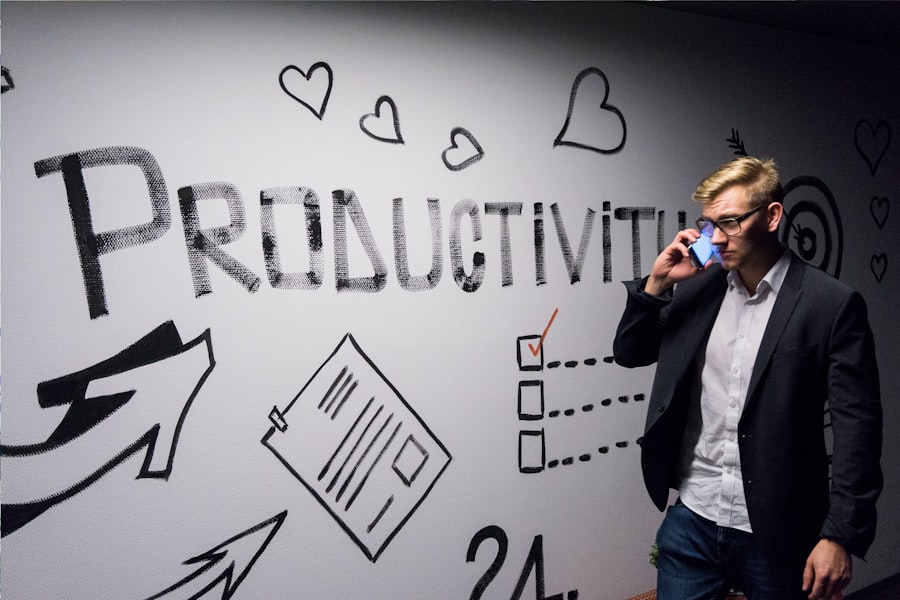In today’s fast-paced world, the concept of productivity has evolved into something far more complex than merely completing tasks. You may find yourself caught in the web of performative productivity, where the act of being busy becomes a badge of honor. This phenomenon is characterized by the need to showcase your productivity to others, often prioritizing appearances over actual accomplishments.
You might notice that your worth is increasingly measured by how much you can achieve in a given timeframe, leading to a culture that glorifies constant busyness. Performative productivity can manifest in various ways, from sharing your daily to-do lists on social media to engaging in endless meetings that may not yield tangible results. You may feel compelled to document every achievement, no matter how small, to validate your efforts in the eyes of peers and superiors.
This relentless pursuit of visibility can create a false narrative around productivity, where the focus shifts from meaningful work to mere performance. As you navigate this landscape, it’s essential to recognize the difference between genuine productivity and the performative kind that seeks external validation.
Key Takeaways
- Performative productivity is the act of appearing busy and productive without actually achieving meaningful results.
- The pressure to perform can lead to stress, anxiety, and a constant need to prove oneself.
- The illusion of productivity can lead to a lack of fulfillment and a sense of emptiness despite being constantly busy.
- Comparison and competition with others can exacerbate the fear of being seen as unproductive.
- Authenticity is important for mental well-being and should be prioritized over the need to appear productive.
The Pressure to Perform
The pressure to perform is an omnipresent force in both professional and personal spheres. You may feel it acutely in your workplace, where deadlines loom and expectations are high. Colleagues may compete for recognition, leading you to believe that your value is directly tied to your output.
This environment can create a sense of urgency that drives you to work harder, often at the expense of your well-being. The constant need to prove yourself can be exhausting, leaving little room for creativity or innovation. Moreover, this pressure extends beyond the workplace.
In your personal life, you might feel compelled to showcase your achievements on social media platforms, curating a life that appears perfect and productive. The fear of falling behind or being perceived as lazy can push you into a cycle of overcommitment and stress. As you strive to meet these expectations, it’s crucial to acknowledge the toll this pressure takes on your mental and emotional health.
Recognizing that you are not alone in feeling this way can be the first step toward breaking free from the cycle of performative productivity.
The Illusion of Productivity

You may have experienced moments when you felt busy yet unproductive, a common occurrence in a world that equates activity with achievement. The illusion of productivity often arises when you engage in tasks that seem important but do not contribute meaningfully to your goals. You might find yourself attending meetings that could have been emails or spending hours on projects that lack direction.
This misalignment between effort and outcome can lead to frustration and a sense of futility. The danger lies in mistaking busyness for effectiveness. You may convince yourself that as long as you are occupied, you are being productive.
However, this mindset can lead to a cycle of dissatisfaction, where you constantly chase after the next task without taking the time to reflect on what truly matters. It’s essential to shift your focus from merely being busy to being intentional about how you spend your time. By prioritizing tasks that align with your values and goals, you can break free from the illusion of productivity and cultivate a more fulfilling approach to your work and life.
The Impact on Mental Health
| Factors | Impact on Mental Health |
|---|---|
| Social Isolation | Increased feelings of loneliness and depression |
| Work-related Stress | Higher levels of anxiety and burnout |
| Financial Strain | Worsened mental health due to economic pressure |
| Access to Mental Health Services | Limited availability leading to unmet needs |
The relentless pursuit of performative productivity can have profound effects on your mental health. You may find yourself grappling with anxiety, stress, and even depression as you strive to meet unrealistic expectations. The constant pressure to perform can lead to feelings of inadequacy and self-doubt, making it difficult for you to appreciate your accomplishments.
Over time, this can erode your self-esteem and contribute to a negative self-image. Additionally, the fear of falling short can create a toxic cycle where you push yourself harder, often neglecting self-care in the process. You might sacrifice sleep, social connections, and leisure activities in favor of work-related tasks, leading to burnout and exhaustion.
It’s crucial to recognize these patterns and understand that prioritizing your mental health is not a sign of weakness but rather an essential component of sustainable productivity. By acknowledging the impact of performative productivity on your well-being, you can take proactive steps toward creating a healthier balance in your life.
Comparison and Competition
In an age dominated by social media and constant connectivity, comparison has become an unavoidable aspect of daily life. You may find yourself scrolling through feeds filled with images of others’ achievements, leading to feelings of inadequacy or envy.
The pressure to keep up can be overwhelming, pushing you further into the realm of performative productivity. This competitive mindset can distort your perception of success and fulfillment. Instead of celebrating your unique accomplishments, you might measure yourself against others’ standards, leading to dissatisfaction and frustration.
It’s essential to recognize that everyone’s path is different; what works for someone else may not be suitable for you. By shifting your focus from comparison to self-improvement, you can cultivate a healthier relationship with productivity that prioritizes personal growth over competition.
The Fear of Being Seen as Unproductive

The fear of being perceived as unproductive can be paralyzing. You may worry about how others view your work ethic or contributions, leading you to overcommit or take on tasks that do not align with your goals. This fear often stems from societal expectations that equate busyness with value; if you’re not constantly working or achieving, you might feel inadequate or judged by peers and superiors alike.
This anxiety can create a vicious cycle where you feel compelled to prove yourself through excessive work while simultaneously fearing that any downtime will be seen as laziness. It’s important to challenge this narrative and recognize that everyone deserves rest and downtime. By reframing your understanding of productivity to include moments of reflection and rejuvenation, you can alleviate some of the pressure associated with being constantly “on.” Embracing a more balanced perspective allows you to prioritize quality over quantity in your work.
The Importance of Authenticity
Authenticity plays a crucial role in breaking free from the constraints of performative productivity. You may find that embracing your true self—flaws and all—can lead to greater fulfillment in both your personal and professional life. When you prioritize authenticity over appearances, you create space for genuine connections and meaningful work.
This shift allows you to focus on what truly matters rather than conforming to external expectations. Being authentic means acknowledging your limitations and recognizing that it’s okay not to have everything figured out. You might discover that vulnerability fosters deeper relationships with colleagues and friends, as they too grapple with similar pressures.
By sharing your struggles and triumphs openly, you contribute to a culture that values honesty over performance, encouraging others to do the same. In this way, authenticity becomes a powerful antidote to the pressures of performative productivity.
The Dangers of Burnout
Burnout is an all-too-common consequence of relentless performative productivity. You may find yourself feeling physically and emotionally drained after prolonged periods of overwork, leading to decreased motivation and engagement in both work and personal life. The signs of burnout can manifest in various ways—chronic fatigue, irritability, or even physical symptoms like headaches or digestive issues—making it essential for you to recognize these warning signs early on.
The dangers of burnout extend beyond individual well-being; they can also impact workplace dynamics and overall productivity levels. When you’re burned out, it becomes increasingly difficult to contribute effectively or maintain positive relationships with colleagues. To combat burnout, it’s crucial to prioritize self-care and establish boundaries around work commitments.
By recognizing the importance of rest and recovery, you can create a sustainable approach to productivity that nurtures both your well-being and professional growth.
The Role of Social Media
Social media plays a significant role in perpetuating the culture of performative productivity. You may find yourself scrolling through curated feeds filled with images of success stories, motivational quotes, and glimpses into others’ seemingly perfect lives. This constant exposure can create unrealistic expectations about what productivity should look like, leading you to compare yourself unfavorably against these idealized portrayals.
Moreover, social media often encourages a culture of oversharing where individuals feel pressured to document every achievement or milestone publicly. This need for validation can detract from genuine experiences and accomplishments, as the focus shifts from intrinsic motivation to external approval. To navigate this landscape more mindfully, consider curating your social media feeds by following accounts that promote authenticity and balance rather than those that contribute to feelings of inadequacy or competition.
Finding Balance and Self-compassion
Finding balance amidst the chaos of performative productivity requires intentional effort and self-compassion. You may need to reassess your priorities and establish boundaries around work commitments while allowing yourself grace during periods of rest or downtime. Embracing self-compassion means recognizing that it’s okay not always to be productive; everyone has moments when they need time for reflection or rejuvenation.
Incorporating practices such as mindfulness or journaling into your routine can help cultivate a greater sense of balance in your life. These practices encourage self-reflection and provide opportunities for gratitude—reminding you of what truly matters beyond mere productivity metrics. By prioritizing self-compassion alongside accountability, you can create a healthier relationship with work that honors both your ambitions and well-being.
Strategies for Overcoming Performative Productivity
To overcome the pitfalls associated with performative productivity, consider implementing several strategies into your daily routine. First, set clear intentions for what constitutes meaningful work for you personally; this clarity will help guide your efforts toward tasks aligned with your values rather than external expectations. Additionally, practice time management techniques such as the Pomodoro Technique or time blocking—these methods encourage focused work sessions followed by breaks that promote sustained energy levels throughout the day.
Another effective strategy involves regularly assessing your commitments; learn to say no when necessary without guilt or fear of judgment from others. Prioritizing quality over quantity allows you more space for creativity while reducing feelings of overwhelm associated with excessive workloads. Finally, cultivate a supportive network by surrounding yourself with individuals who value authenticity over performance; these connections will reinforce positive habits while providing encouragement during challenging times.
By implementing these strategies into your life gradually over time—alongside fostering self-compassion—you’ll be better equipped not only to navigate challenges related specifically performative productivity but also cultivate an overall sense fulfillment within both personal professional realms alike.
In today’s fast-paced work environment, the issue of performative productivity—where employees focus more on appearing busy rather than being genuinely productive—has become increasingly prevalent. This phenomenon can lead to burnout and decreased job satisfaction, as individuals prioritize the appearance of hard work over meaningful accomplishments. An insightful article on this topic can be found on How Wealth Grows, where the author delves into the underlying causes of performative productivity and offers strategies to combat this trend. By understanding and addressing these issues, both employees and employers can foster a more authentic and effective work culture.
HERE IS WHY Most Careers Are Designed To Fail
FAQs
What is performative productivity?
Performative productivity refers to the act of appearing busy and productive without actually accomplishing meaningful work. It often involves focusing on tasks that are easily visible or measurable, rather than those that are truly important or impactful.
What are the problems with performative productivity?
The problems with performative productivity include a lack of meaningful progress, burnout, and a focus on quantity over quality. It can also lead to a culture of overwork and stress, as individuals feel pressured to constantly appear busy and productive.
How does performative productivity impact individuals and organizations?
Performative productivity can lead to individuals feeling overwhelmed and stressed, as they prioritize the appearance of productivity over their well-being. In organizations, it can result in a culture of presenteeism and a lack of focus on meaningful outcomes.
What are some signs of performative productivity?
Signs of performative productivity include constantly being busy but not accomplishing meaningful tasks, a focus on visible or easily measurable work, and a reluctance to take breaks or prioritize self-care.
How can individuals and organizations address performative productivity?
To address performative productivity, individuals and organizations can focus on setting meaningful goals, prioritizing well-being, and creating a culture that values quality work over the appearance of busyness. This may involve reevaluating priorities, setting boundaries, and promoting a healthy work-life balance.
